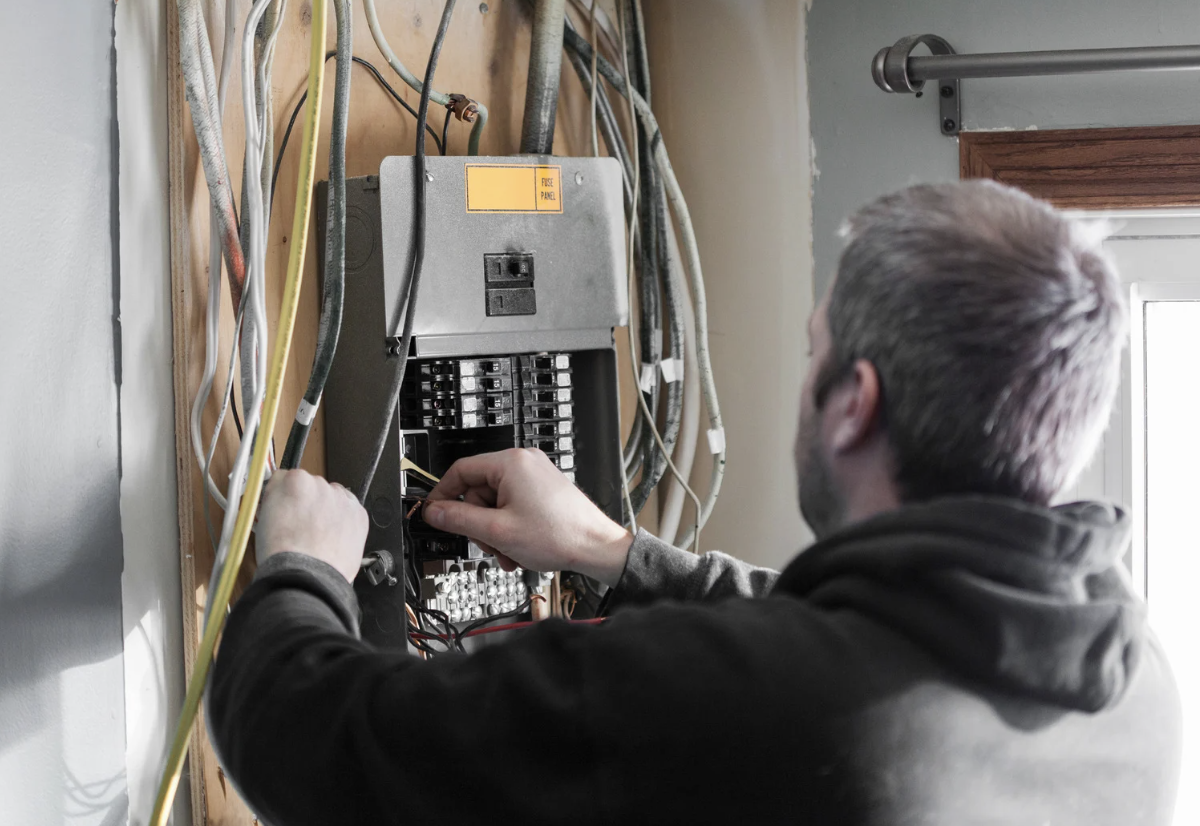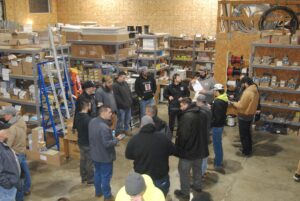
Smart home technology is transforming the way we live, offering convenience, energy efficiency, and enhanced security. While many are familiar with smart devices like thermostats and lighting, a comprehensive smart home goes beyond individual gadgets. With smart home electrical upgrades, homeowners can integrate and automate various systems, from lighting and HVAC to security and appliances, creating a truly connected home environment. This guide explores the essentials of smart home electrical upgrades, the role of a smart home electrician, and how electrical automation can elevate your home’s functionality and efficiency.
Why Consider Smart Home Electrical Upgrades?
Enhanced Convenience and Control
Smart home electrical upgrades offer seamless control over various home functions, all accessible through smartphones or centralized control panels. This enhanced control allows homeowners to adjust lighting, temperature, security, and even appliances with a simple tap or voice command, adding unparalleled convenience to daily life.
Energy Efficiency and Cost Savings
By automating systems like lighting and HVAC, smart home technology optimizes energy use, reducing waste and lowering utility bills. For example, smart thermostats adjust heating and cooling based on occupancy, and automated lighting can turn off when rooms are unoccupied, conserving energy.
Improved Security
Smart home security systems offer advanced features, including remote monitoring, motion detection, and automated alerts. By upgrading your home’s electrical system to support security cameras, smart locks, and alarms, you gain peace of mind with 24/7 control over your home’s security.
Key Smart Home Electrical Upgrades
1. Smart Lighting Systems
Smart lighting allows you to control and automate lighting throughout your home. Beyond simple on-off control, smart lighting systems can adjust brightness, change colors, and sync with other devices for customized ambiance and energy efficiency.
- Motion-Sensor Lights: Motion-sensor lights automatically turn on when someone enters a room, saving energy by reducing unnecessary lighting.
- Dimmable and Color-Changing LEDs: Smart LEDs offer customizable color and brightness settings, allowing you to create specific moods or adjust lighting to time-of-day preferences.
- Voice-Controlled Lighting: Many smart lighting systems are compatible with voice assistants, providing hands-free control over lights in any room.
2. Smart Thermostats and HVAC Automation
A smart thermostat allows for precise control over your home’s temperature, often learning your preferences to automate heating and cooling. These devices can adapt based on your schedule, saving energy by avoiding unnecessary heating or cooling when you’re not home. Many smart thermostats also offer remote access, so you can adjust your home’s temperature while away, ensuring comfort upon arrival.
3. Automated Window Shades
Smart window shades can adjust to time, temperature, and lighting conditions, allowing you to manage natural light efficiently. By automating shades, you can improve privacy, control room temperatures, and reduce the need for artificial lighting during daylight hours. Integrating shades with smart lighting and HVAC systems can further enhance energy efficiency.
4. Smart Outlets and Switches
Smart outlets and switches bring automation to almost any device. By plugging appliances into smart outlets, you can control them remotely, set schedules, or turn them off automatically to reduce energy consumption. Smart switches offer similar functionality for lighting, fans, or other fixtures, making it easy to convert standard appliances into smart devices.
5. Smart Security Systems
Smart security systems provide an added layer of protection, with features such as motion sensors, security cameras, doorbell cameras, and automated locks. These devices send alerts to your smartphone if they detect movement or entry, allowing you to monitor your home from anywhere. Automated security systems can also integrate with smart lighting, which can turn lights on if motion is detected outside.
6. Whole-Home Audio and Visual Automation
Whole-home audio and visual systems allow you to control entertainment devices in different rooms, often synchronizing music or video for seamless transitions throughout the home. With a centralized control system, you can stream music to speakers in each room or play a movie on multiple screens, creating an immersive entertainment experience.
7. Smart Appliances
From refrigerators with internal cameras to ovens you can preheat from your phone, smart appliances bring convenience and efficiency to the kitchen and laundry room. These appliances offer remote monitoring, energy-efficient settings, and alerts for maintenance needs, providing an elevated level of control over household chores.
How Electrical Automation Works
Electrical automation systems, often managed through a central control hub or smartphone app, allow you to monitor and adjust connected devices remotely. This connectivity is made possible through Wi-Fi, Bluetooth, or Z-Wave technology, which links your devices to your home’s central automation system. Many smart home electricians recommend installing a smart hub to streamline control, integrating all automated systems under one interface.
Choosing a Central Hub
There are several types of central hubs for managing a smart home, including systems from popular brands like Amazon, Google, and Apple. Each hub offers compatibility with various smart devices and provides unique features, so choosing one depends on your preferred smart devices and your overall smart home goals.
Programming Scenes and Schedules
Smart home systems allow you to create “scenes” and schedules for different times of day or occasions. For example, you can set a “Goodnight” scene that turns off all lights, locks doors, and lowers the thermostat. Schedules automate these routines, eliminating the need to make individual adjustments and improving energy efficiency.
Integrating Voice Control
Voice assistants like Alexa, Google Assistant, and Siri can integrate with many smart home systems, allowing you to control lights, temperature, and other devices with voice commands. Voice control adds convenience and accessibility, especially for tasks like adjusting lighting or checking security camera feeds hands-free.
The Role of a Smart Home Electrician
A smart home electrician plays a crucial role in installing and maintaining your home’s electrical automation. Unlike standard electricians, smart home electricians specialize in integrating automation systems and ensuring compatibility between devices. Their expertise ensures that all smart devices function seamlessly and that your home’s electrical system can support the added load of smart home technology.
Evaluating Your Electrical System
Smart home upgrades may require increased electrical capacity, especially if you’re adding multiple devices. A smart home electrician evaluates your current system, assesses its capacity, and recommends any necessary upgrades to support your automation goals.
Installation of Automation Hubs and Devices
Smart home electricians are skilled in setting up centralized hubs, connecting devices, and configuring automation systems. They ensure that all devices are correctly installed and synchronized with your smart home hub, minimizing potential connectivity or compatibility issues.
Troubleshooting and Maintenance
Once your smart home system is up and running, periodic maintenance and troubleshooting are necessary to keep it functioning smoothly. A smart home electrician can troubleshoot connectivity issues, update firmware, and replace outdated components, ensuring that your system remains efficient and responsive.
Cost Considerations for Smart Home Electrical Upgrades
Initial Installation Costs
The cost of smart home electrical upgrades varies depending on the number and complexity of the devices you install. Common upgrades, such as smart lighting or a thermostat, are typically affordable, while whole-home automation systems, which include hubs, lighting, security, and HVAC integration, can be more costly.
Energy Savings
While there’s an upfront cost to installing smart devices, energy-efficient upgrades can save on utility bills over time. Automated thermostats, lighting, and HVAC systems can significantly reduce energy consumption, offering long-term savings that offset the initial investment.
Future Scalability
Consider scalability when planning your smart home upgrades. As technology advances, you may want to add more devices or upgrade existing ones. A smart home electrician can recommend systems that are flexible and compatible with future expansions, allowing your smart home to grow along with your needs.
Smart Home Automation Safety and Security
Protecting Against Power Surges
Power surges can damage sensitive smart devices, so installing whole-home surge protection is essential. A smart home electrician can add surge protection to your main electrical panel, safeguarding your connected devices from voltage spikes and ensuring electrical surge safety.
Securing Your Smart Home Network
Many smart home devices are connected to Wi-Fi, making network security vital for protecting against cyber threats. Using strong passwords, securing your Wi-Fi network, and enabling device encryption help protect your smart home from unauthorized access. Regularly updating device firmware and setting up secure logins for your automation hub further enhance security.
Monitoring Device and System Health
Smart home systems often come with built-in monitoring features that provide alerts for device malfunctions, connectivity issues, or low battery levels. Monitoring these alerts helps you stay on top of system maintenance and ensures that all components function reliably.
The Future of Smart Home Technology
Smart home technology continues to evolve, with advancements in AI, machine learning, and device connectivity promising even more sophisticated automation. New devices and systems focus on personalization, allowing smart homes to adapt to the unique preferences of homeowners over time. As technology advances, a growing number of devices, from furniture to appliances, are becoming “smart,” transforming home automation into an intuitive and highly customizable experience.
Conclusion: Embrace Smart Home Electrical Upgrades for a Modern, Connected Home
Smart home electrical upgrades offer a seamless way to improve energy efficiency, convenience, and security. From smart lighting and automated HVAC systems to enhanced security and centralized control, these upgrades make life at home easier and more enjoyable. A smart home electrician ensures that your systems are installed safely, function efficiently, and are prepared for future technology advancements. By investing in electrical automation, you create a connected, responsive environment that enhances comfort, saves energy, and provides peace of mind.
Frequently Asked Questions
Do I need a professional electrician for smart home upgrades?
Yes, a smart home electrician ensures that devices are installed correctly and your electrical system can handle the additional load, providing safety and efficiency.
What’s the best smart hub for my home?
The best hub depends on your existing devices and preferences. Amazon Alexa, Google Assistant, and Apple HomeKit offer popular options with extensive compatibility.
How can I improve energy efficiency with smart home upgrades?
Installing smart thermostats, lighting, and automated window shades can optimize energy use, reducing waste and lowering utility bills.
Is smart home technology secure?
While smart devices can be vulnerable to cyber threats, securing your Wi-Fi network, using strong passwords, and keeping device firmware updated enhances safety.
What should I consider before upgrading to a smart home system?
Consider your current electrical system’s capacity, desired automation features, compatibility of devices, and future expansion potential. A smart home electrician can guide you through these considerations.







